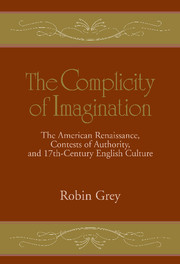 The Complicity of Imagination
The Complicity of Imagination Book contents
- Frontmatter
- Contents
- Acknowledgments
- Cambridge studies in American Literature and Culture
- Introduction: Antebellum America and the Culture of Seventeenth-Century England
- 1 Cultural Predicaments and Authorial Responses
- 2 “A Seraph's Elequence” Emerson's Inspired Language and Milton's Apocalyptic Prose
- 3 Margaret Fuller's “The Two Herberts,” Emerson, and the Disavowal of Sequestered Virtue
- 4 “As if a green bough were laid across the page”: Thoreau's Seventeenth-Century Landscapes and Extravagant Personae
- 5 Melville's Mardi and Moby-Dick, Marvelous Travel Narratives, and Seventeenth-Century Methods of Inquiry
- 6 Surmising the Infidel: Melville Reads Milton
- Notes
- Index
- Cambridge Cultural Social Studies
1 - Cultural Predicaments and Authorial Responses
Published online by Cambridge University Press: 05 November 2009
- Frontmatter
- Contents
- Acknowledgments
- Cambridge studies in American Literature and Culture
- Introduction: Antebellum America and the Culture of Seventeenth-Century England
- 1 Cultural Predicaments and Authorial Responses
- 2 “A Seraph's Elequence” Emerson's Inspired Language and Milton's Apocalyptic Prose
- 3 Margaret Fuller's “The Two Herberts,” Emerson, and the Disavowal of Sequestered Virtue
- 4 “As if a green bough were laid across the page”: Thoreau's Seventeenth-Century Landscapes and Extravagant Personae
- 5 Melville's Mardi and Moby-Dick, Marvelous Travel Narratives, and Seventeenth-Century Methods of Inquiry
- 6 Surmising the Infidel: Melville Reads Milton
- Notes
- Index
- Cambridge Cultural Social Studies
Summary
It may seem little less than an American cultural heresy to suggest that Emerson, who demanded “an original relation to the universe,” turned to seventeenth-century English culture as he confronted cultural and social dilemmas in his own country. Indeed, for all the public cries for nativist literature and a national culture, for all the insistence upon indigenous productions and the throwing off of an “aristocratic” or “feudal” English culture, there appears to have been no reticence among the authors of the American Renaissance in turning to the England of this earlier age. For them it was an age that seemed to possess the inexhaustible vitality of uncompromising convictions and revolutionary urgency, of nervous energy and resourcefulness. As Robert Weisbuch has already established for the Romantic and Victorian periods, nineteenth-century Americans consistently distinguished among periods of English culture. Orestes Brownson, a radical Democrat with Transcendentalist leanings, articulated what seems to have been a truism to a number of other American authors regarding pre-Restoration seventeenth-century English culture: that its moments of religious, political, and philosophical controversy produced the richest literature and the flowering of what he identified as “culture.” In an 1840 article on “American Literature,” Brownson pointed out the importance of heterodoxy in advancing English culture, implicitly pointing to the potential for a flourishing national culture in the United States: The history of the Church shows, that its literature springs up in its seasons of controversy with paganism, heresy, philosophy, or infidelity.
- Type
- Chapter
- Information
- The Complicity of ImaginationThe American Renaissance, Contests of Authority, and Seventeenth-Century English Culture, pp. 18 - 51Publisher: Cambridge University PressPrint publication year: 1997
